The Psychology of Overthinking: How It Affects Your Life and Mind: And What to Do If You Cant Stop Overthinking
Overthinking can silently disrupt your mental health, productivity, and relationships. In this blog, we explore the psychology of overthinking—its causes, impact on your brain and daily life, the emotional and social toll it takes, and proven strategies to overcome it. Whether you’re struggling with anxiety or simply want peace of mind, this guide offers clear, actionable solutions to break the cycle of overthinking and reclaim control over your thoughts.
MENTAL HEALTH
Muhammad Haider Raza
8/7/20254 min read
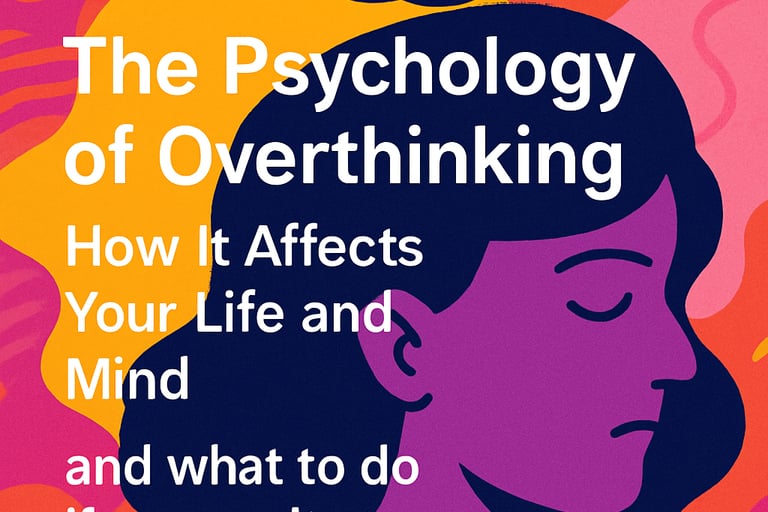

Colorful banner showing the concept of overthinking with tangled thoughts and stressed mind, representing the psychology of overthinking and its mental impact
🧠 What is Overthinking?
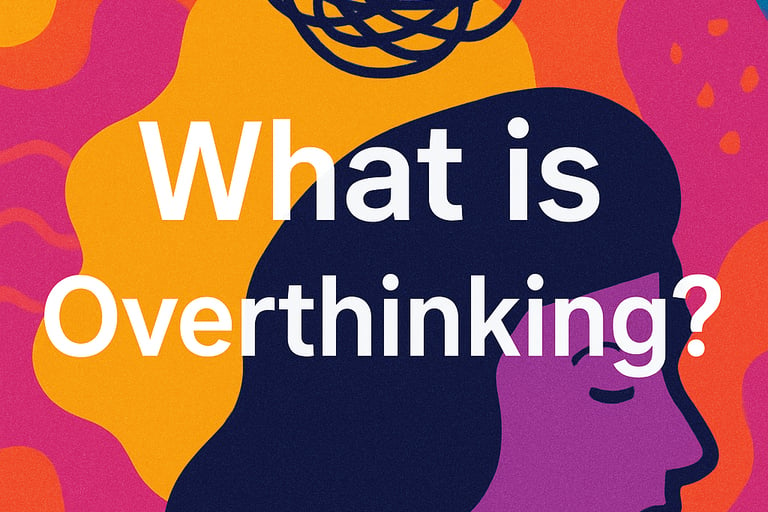

Overthinking is the act of dwelling excessively on a thought, decision, or situation — often leading to mental exhaustion, emotional imbalance, and indecisiveness. It’s not simply thinking deeply. It’s when thoughts repeat endlessly, without resolution, creating a loop of anxiety, fear, and doubt.
Almost everyone overthinks at some point, but when it becomes a daily pattern, it can affect every aspect of life — from productivity and sleep to relationships and mental health.
🔍 Common Reasons Behind Overthinking
Illustration of a person overwhelmed by swirling thoughts, symbolizing the definition and concept of overthinking.
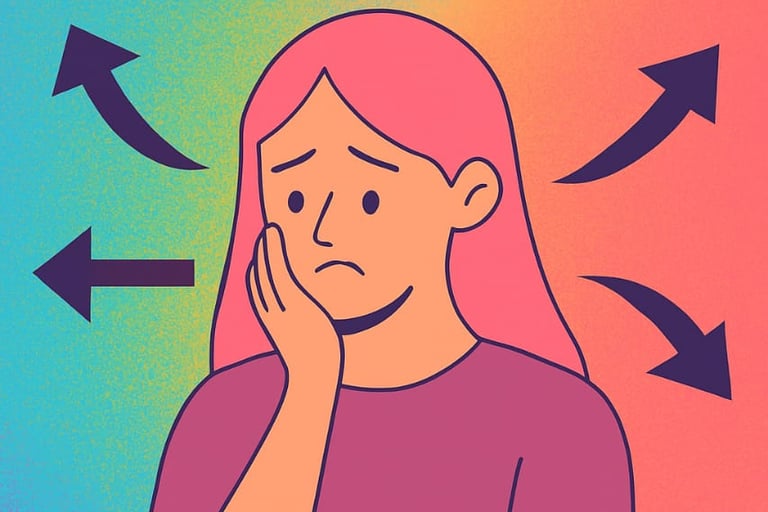

Flat-style image showing multiple arrows and decision points, representing the causes and triggers of overthinking.
Understanding the root causes can help in tackling the problem. Here are the most common reasons why people fall into the trap of overthinking:
1. Fear of the Unknown: The uncertainty of future outcomes often fuels mental spirals.
2. Perfectionism: Constantly needing to make the “right” decision can cause paralysis.
3. Low Self-Esteem: Doubting your capabilities leads to repeated questioning of your actions.
4. Trauma or Past Mistakes: Unresolved pain or regret may keep replaying in the mind.
5. Social Pressure: Trying to meet societal expectations or peer comparison can lead to analysis paralysis.
🔄 Impact of Overthinking on Daily Life
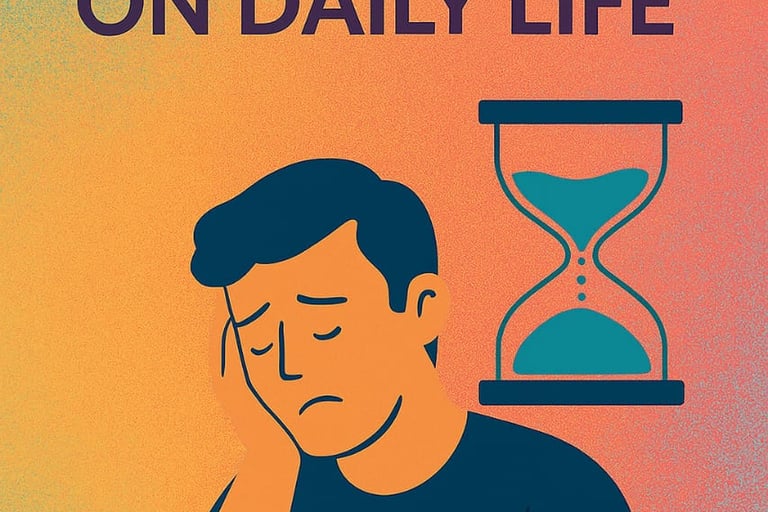

Overthinking doesn’t just affect thoughts; it gradually creeps into your daily routines and productivity:
• Procrastination: Delaying tasks due to fear of failure or judgment.
• Lack of Sleep: Racing thoughts at night can severely affect sleep cycles.
• Poor Decision-Making: Indecisiveness due to “what if” thinking.
• Loss of Focus: Difficulty in concentrating on important tasks.
• Fatigue: Mental energy is consumed in endless loops of thought.
💔 The Emotional Pain of Overthinking
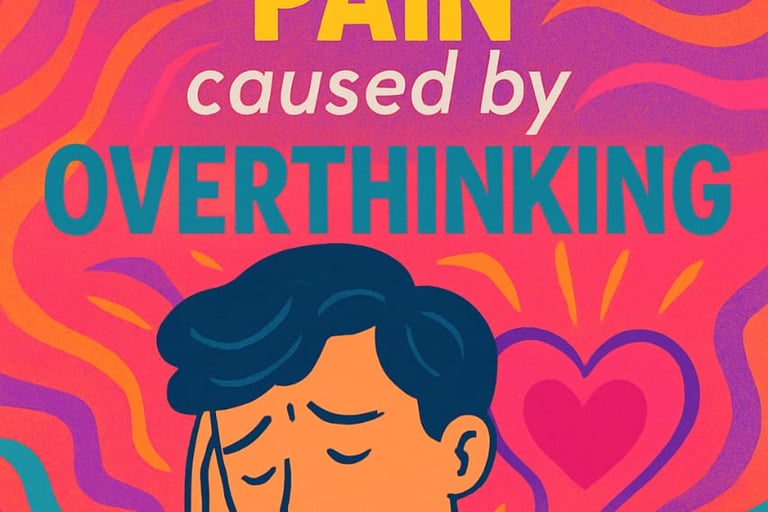

Visual of a distracted individual in everyday settings, portraying how overthinking disrupts routine life activities.
Illustration of a person sitting alone with a heavy heart, expressing the emotional toll of persistent overthinking.
The mental distress caused by overthinking often goes unnoticed by others — but for the person experiencing it, the pain is real and deep:
• Constant worry and tension
• Feeling overwhelmed by minor decisions
• Guilt over the past or anxiety about the future
• Loneliness and withdrawal
• Fear of judgment or rejection
Over time, this emotional weight can evolve into anxiety disorders, depression, or chronic stress.
👥 Social Consequences of Overthinking
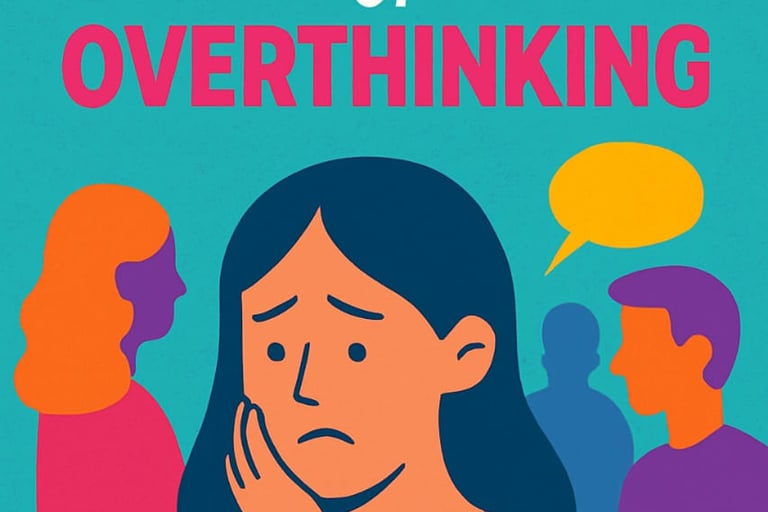

Flat design showing social isolation and relationship stress caused by excessive overthinking.
Overthinking not only affects the individual but also those around them:
• Communication issues from over-analyzing conversations
• Isolation due to the fear of judgment or saying the wrong thing
• Misunderstandings and trust issues in relationships
• Avoidance of social events
These effects can lead to a shrinking social circle and a sense of loneliness.
🧠 Mental Pressure on the Brain caused by overthinking
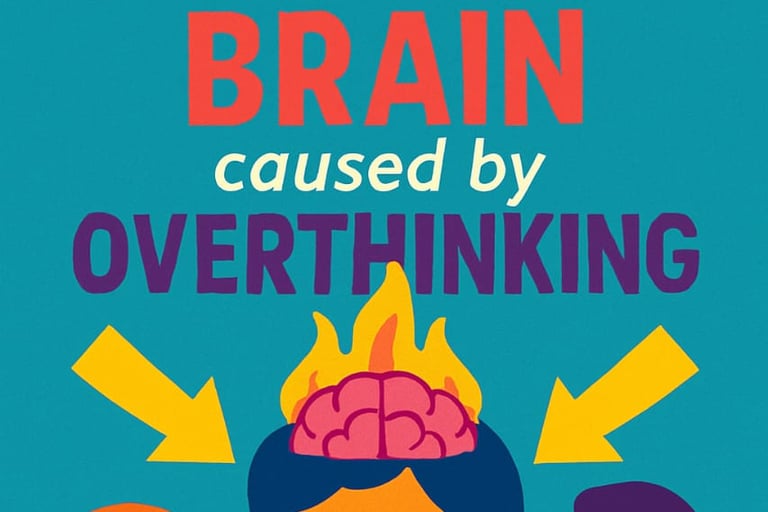

Image of a brain under pressure with tangled lines, symbolizing the neurological and cognitive load of overthinking.
Neurologically, overthinking activates the amygdala, the brain’s fear center, and keeps it in an alert state. This increases cortisol (the stress hormone) levels, which in turn:
• Inhibits clear thinking and memory
• Lowers immune response
• Increases the risk of mental disorders
• Causes physical symptoms like headaches, chest tightness, or digestive issues
• Reduced cognitive function like memory and focus
• Difficulty staying present or enjoying the moment
The brain becomes stuck in a loop of threat detection — even when no real danger exists.
🛑 What to Do When You Can’t Stop Overthinking?
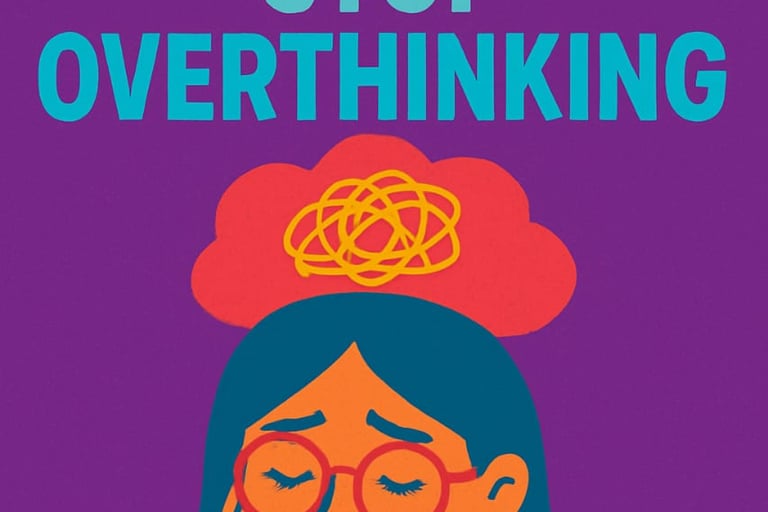

Positive and calming visual of a person meditating or journaling, illustrating solutions to manage overthinking.
If you find yourself trapped in overthinking, here are actionable steps to regain control:
1. Practice Mindfulness or meditation
Stay in the present. Focus on what’s happening now, not what might happen. Use techniques like deep breathing, guided meditation, or body scanning.
2. Label the Thought
Say to yourself:
“I’m overthinking right now. This thought is not helpful.”
Labeling thoughts helps detach from them emotionally.
3. Write it Down
Journaling can offload repetitive thoughts and give clarity. Sometimes seeing your thoughts on paper is enough to break the cycle.
4. Set a Time Limit
Give yourself 10 minutes a day to think/worry — and when time’s up, shift your focus.
5. Challenge Your Negative Thoughts
With Evidence and Logic
Ask:
• Is this fear realistic?
• What’s the worst-case scenario?
• Will this matter a month from now?
6. Take Action
Even small action steps can break the overthinking loop. Doing something is often better than waiting for the “perfect” choice.
7. Talk It Out
Discussing your thoughts with a trusted friend, coach, especially a therapist or mental health expert can provide you proper guidance and can bring clarity.
8. Limit Information Overload
Too much social media, news, or comparison leads to more anxiety. Filter what you consume.
📣 Final Thoughts
Overthinking is not a weakness, but a mental habit — one that can be unlearned with awareness and effort. By recognizing its triggers, understanding its impact, and applying practical solutions, you can break the cycle and reclaim mental peace.
🌿 Remember: Your thoughts are not facts.
You are not your overthinking. You are the observer who can change the pattern.
🙌 Help Others: Share This Blog
If this post helped you understand overthinking better, please consider sharing it with friends or family who might be silently struggling.
📌 You’re not alone, and help is always possible.
